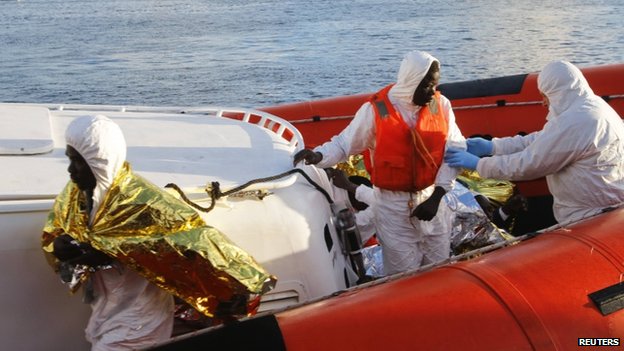The drowning of more than 300 migrants in the Mediterranean Sea this week could have been prevented with better EU lifesaving provisions, experts say.
The UN’s refugee agency, UNHCR, says more migrants are dying because search and rescue efforts have been reduced.
Italy’s major patrol and rescue operation ended last year. A smaller scale EU operation, Triton, took over.
The UNHCR says about 3,500 migrants died trying to cross the Mediterranean Sea to Europe in 2014.
In the latest disaster, more than 300 people drowned after the four dinghies they were travelling in got into trouble setting off across the sea from Libya – a favoured but perilous route used by migrants trying to get to Europe.
“We warned everybody in October that by lowering the tension and the operational capacity of the search and rescue operation, this might happen,” Carlotta Sami, the UNHCR’s representative for southern Europe, told the BBC.
She said tragedies such as this would happen again if the EU did not take urgent action to scale up its search and rescue operation.
“The EU has done too little too late,” she said. “The influx of refugees and migrants crossing the Mediterranean will not stop.”
Coffins
Bodies of the migrants were brought to the Italian island of Lampedusa on Wednesday where they were lined up along a harbour, while an old airport was used as a temporary morgue.
Some of the victims died as they tried to cross the Mediterranean in freezing, rough conditions, but others – in a poor condition – died during the rescue operation by the Italian coast guard. Coffins were transported away for burial.
In November, Italy ended its operation known as Mare Nostrum, which was launched in October 2013 in response to a tragedy off Lampedusa, in which 366 people died.
The EU now runs a border control operation, called Triton, which only operates close to Europe’s coast and has fewer ships.
The International Organization for Migration (IOM) says more people could have been saved in the latest disaster.
“We think it could certainly have been prevented had there been a better life-saving flotilla or task force in place,” said Leonard Doyle, IOM spokesman.
“The Mediterranean rescue flotilla, which was known as Mare Nostrum, isn’t there anymore because a political decision has been taken that this was attracting people to attempt to cross the Mediterranean,” said Mr Doyle.
“If anybody believes that taking away the lifeguards… taking away the security and the rescue mission… [is] going to deter people, that’s just frankly incorrect.”
BBC
 Q FM Africa's Modern Radio
Q FM Africa's Modern Radio

